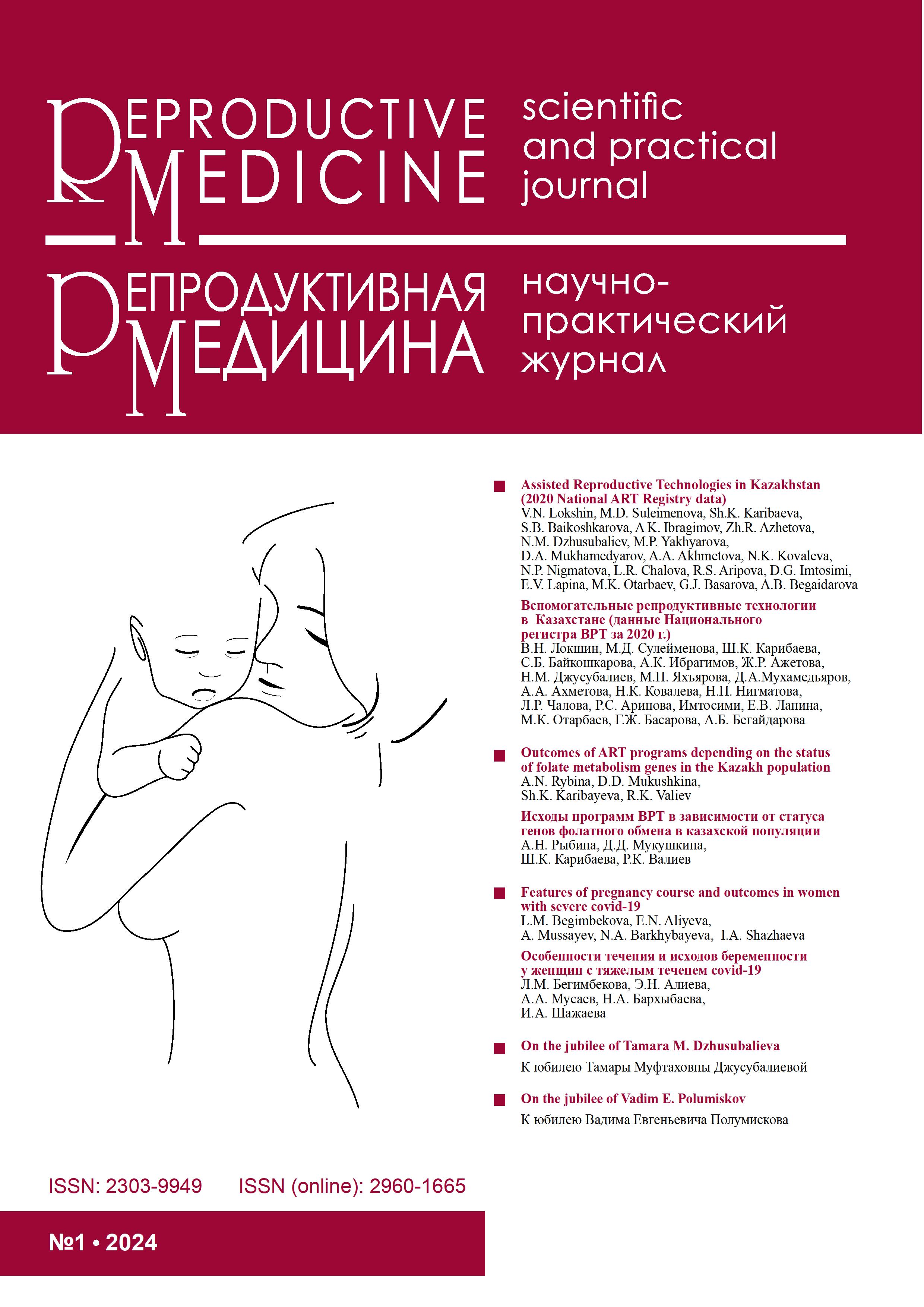Assessment impact of vitamin D on premenstrual syndrome in adolescent girls with primary dysmenorrhea
DOI:
https://doi.org/10.37800/RM.1.2024.88-95Keywords:
adolescents, primary dysmenorrhea, vitamin D, premenstrual syndrome (PMS), randomized controlled trial (RCT)Abstract
Relevance: The reviewed publications on the problem of premenstrual syndrome (PMS) in adolescent girls and young women indicate the use of various dietary supplements before menstruation to relieve PMS. However, in parallel with studies that reflect the positive effects of vitamin D, some studies do not confirm such relationships. More research is needed to detail and confirm the effectiveness or ineffectiveness of vitamin D supplementation, the possible dosage requirements of vitamin D supplementation, and the long-term efficacy of vitamin D supplementation.
The study aimed to evaluate the effect of vitamin D on the nature of PMS in adolescent girls with primary dysmenorrhea (PD).
Materials and methods: The study was conducted at the Regional Perinatal Center in Aktobe, Kazakhstan. The study included 191 adolescent girls with PD. Participants were randomly assigned to two groups: a study group of 96 adolescent girls who received vitamin D, and a control group of 95 adolescent girls who received a placebo. At the beginning and after three months of examination, all teenage girls were surveyed to identify signs of PMS, and the level of 25(OH) vitamin D in the blood serum was determined.
Results: Among the examined teenage girls with PD and PMS, more than 70% are characterized by a deficiency in the level of vitamin D in the body. In the main group after the study, a statistically significant increase in vitamin D levels was revealed (p<0.001). At the beginning, the prevalence of PMS among adolescent girls with PD in the study group was 51.7%; after vitamin D supplementation, this value decreased to 23% (p<0.001). In the control group, cases of PMS in the sequence before and after taking placebo increased from 35% to 42.5%.
Conclusion: Vitamin D supplementation for three months significantly improves the studied signs of PMS among adolescent girls with primary dysmenorrhea, in addition, it significantly improves the course of the menstrual cycle, in particular, by normalizing the duration of menstruation in days and the abundance of discharge.
References
Dutta A, Sharma A. Prevalence of premenstrual syndrome and premenstrual dysphoric disorder in India: A systematic review and meta-analysis. Health promotion perspectives. 2021;2(11):161.
https://doi.org/10.34172/hpp.2021.20
Елгина С.И., Кинтикова И.А., Попов А.О., Мозес В.Г., Рудаева Е.В., Мозес К.В., Черных Н.С. Предменструальный синдром у студенток медицинского ВУЗа. Частота. Клинические проявления. Медицина в Кузбассе. 2022;3:65-68.
Elgina SI, Kintikova IA., Popov AO, Moses VG, Rudaeva EV, Moses KV, Chernykh NS. Premenstrual syndrome in female medical students. Frequency. Clinical manifestations. Medicina v Kuzbasse. 2022;3:65-68.
https://doi.org/10.24412/2687-0053-2022-3-65-68
Bahrami A, Ariakia F, Ferns GA, Ghayour-Mobarhan M. The Prevalence of Menstrual Problems amongst Adolescent Girls in
Northeastern Iran. Journal of Advances in Medical and Biomedical Research. 2022;138(30):61-68.
https://doi.org/10.30699/jambs.30.e55702
Roomruangwong C, Carvalho AF, Comhaire F, Maes M. Lowered plasma steady-state levels of progesterone combined with declining progesterone levels during the luteal phase predict peri-menstrual syndrome and its major subdomains. Frontiers in psychology. 2019;10:2446.
https://doi.org/10.3389/fpsyg.2019.02446
Ayhan İ, Altuntaş İ, Üzümcü İ, Erbaş O. Premenstrual syndrome mechanism in the brain. Demiroglu Science University Florence
Nightingale Journal of Medicine. 2021;2(7):213-224.
https://doi.org/10.5606/fng.btd.2021.25069
Ruqaiyah R, Wulandari IA, Harun A, Irwan H, Amir F, Alamsyah A. Differences in Prostaglandin f2α Level in Adolescent Girls Experienced and Not Experienced Premenstrual Syndrome: A Cross-Sectional Study. Poltekita: Jurnal Ilmu Kesehatan. 2023;3(17):572-578.
https://doi.org/10.33860/jik.v17i3.2491
Paul S, Pal A. Premenstrual Syndrome, and Premenstrual Dysphoric Disorder: A Review of their History with an Eye on Future. Annals
of Indian Psychiatry. 2022;4(6).
https://doi.org/10.4103/aip.aip_16_22
Bahrami A, Avan A, Sadeghnia HR, Esmaeili H, Tayefi M, Ghasemi F, Salehkhani FN, Arabpour-Dahoue M, Rastgar-Moghadam A, Gordon AF, Bahrami-Taghanaki H, Ghayour-Mobarhan M. High dose vitamin D supplementation can improve menstrual problems, dysmenorrhea, and premenstrual syndrome in adolescents. Gynecological Endocrinology. 2018;8(34):659-663. https://doi.org/10.1080/09513590.2017.1423466
Alicia CJ, El-Sohemy А. Association between Vitamin D Status and Premenstrual Symptoms. Journal of the Academy of Nutrition and Dietetics. 2019;1(119):115-123. ISSN 2212-2672.
https://doi.org/10.1016/j.jand.2018.06.014
Heidari H, Abbasi K, Feizi A, Kohan Sh, Amani R. Effect of vitamin D supplementation on symptoms severity in vitamin D insufficient women with premenstrual syndrome: A randomized controlled trial. Clinical Nutrition ESPEN. 2024;59:241-248. ISSN 2405-4577 https://doi.org/10.1016/j.clnesp.2023.11.014
Łagowska K. The Relationship between Vitamin D Status and the Menstrual Cycle in Young Women: A Preliminary Study. Nutrients. 2018;10(11):1729.
https://doi.org/10.3390/nu10111729
Кульжанова Д., Донаева А., Аккожина А., Аманжолкызы A., Калдыбаева А., Нургалиева Р., Омарова А. Витамин D и первичная дисменорея. Репродуктивная медицина. 2023;3(56):50-56.
Kulzhanova D., Donaeva A., Akkozhina A., Amanzholkyzy A., Kaldybaeva A., Nurgalieva R., Omarova A. Vitamin D and primary dysmenorrhea. Reprod Med. 2023;3(56):50-56.
https://doi.org/10.37800/RM.3.2023.50-56
Holick MF, Binkley NC, Bischoff-Ferrari HA, Gordon CM, Hanley DA, Heaney RP, Murad MH, Weaver CM. Evaluation, Treatment, and Prevention of Vitamin D Deficiency: an Endocrine Society Clinical Practice Guideline. The Journal of Clinical Endocrinology & Metabolism. 2011;7(96):1911-1930.
https://doi.org/10.1210/jc.2011-0385
Ramasamy I. Vitamin D Metabolism and Guidelines for Vitamin D Supplementation. Clin Biochem Rev. 2020;41(3):103-126. https://doi.org/10.33176/AACB-20-00006
Gold DR, Litonjua AA, Carey VJ, Manson JE, Buring JE, Lee IM, Gordon D, Walter J, Friedenberg G, Hankinson JL, Copeland T., Luttmann-Gibson H. Lung VITAL: Rationale, design, and baseline characteristics of an ancillary study evaluating the effects of vitamin D and/or marine omega-3 fatty acid supplements on acute exacerbations of chronic respiratory disease, asthma control, pneumonia and lung function in adults. Contemp Clin Trials. 2016;47:185-195.
https://doi.org/10.1016/j.cct.2016.01.003
Исенова С.Ш., Сапаралиева А.М., Абдыкалыкова Б.И., Бодыков Г.Ж. Медико-социальные аспекты дисменореи в Казахстане.
Вестник КазНМУ. 2020;2.
Isenova SSh, Saparalieva AM, Abdykalykova BI, Bodykov GZh. Medical and social aspects of dysmenorrhea in Kazakhstan. Vestnik
KazNMU. 2020;2.
https://cyberleninka.ru/article/n/mediko-sotsialnye-aspekty-dismenorei-v-kazahstane
Исенова С.Ш., Кабыл Б.К., Бищекова Б.Н., Сапаралиева А.М., Рахимов А.Е., Исина Г.М., Досова Л.И., Нелюбин С.А. Осо- бенности менструального цикла у студенток 1-5 курсов медицинского вуза. Вестник Казахского национального медицинского
университета. 2020;1:4-9.
Isenova SSh, Kabyl BK, Bishchekova BN, Saparalieva AM, Rakhimov AE, Isina GM, Dosova LI, Nelyubin SA. Features of the menstrual cycle among female students of 1-5 years of medical school. Vestnik Kazahskogo nacional'nogo medicinskogo universiteta. 2020;1:4-9.
Алимбаева Г.Н., Нурбаева Т.Ю. Особенности клинических проявлений предменструального синдрома у девушек-подростков. Репродуктивное здоровье. Восточная Европа. 2022;3(12):325-337.
Alimbaeva GN., Nurbaeva TYu. Features of clinical manifestations of premenstrual syndrome in teenage girls. Reproduktivnoe zdorov'e.
Vostochnaja Evropa. 2022;3(12):325-337.
Downloads
Published
How to Cite
Issue
Section
License
Copyright (c) 2024 The rights to a manuscript accepted for publication are transferred to the Journal Publisher. When reprinting all or part of the material, the author must refer to the primary publication in this journal.

This work is licensed under a Creative Commons Attribution-NonCommercial-NoDerivatives 4.0 International License.
The articles published in this Journal are licensed under the CC BY-NC-ND 4.0 (Creative Commons Attribution – Non-Commercial – No Derivatives 4.0 International) license, which provides for their non-commercial use only. Under this license, users have the right to copy and distribute the material in copyright but are not permitted to modify or use it for commercial purposes. Full details on the licensing are available at https://creativecommons.org/licenses/by-nc-nd/4.0/.




